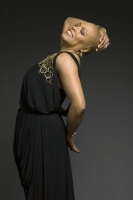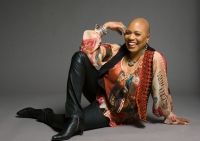
Dee Dee Bridgewater, Eleanora Fagan (1917-1959): To Billie With Love From Dee Dee
 Over the course of a multifaceted career that has spanned four decades, Dee Dee Bridgewater has risen to the top tier of today’s jazz vocalists, putting her own unique spin on standards as well as taking intrepid leaps of faith in re-envisioning jazz classics. For her latest recording, Eleanora Fagan (1917-1959): To Billie With Love From Dee Dee, Bridgewater honors an iconic jazz figure, Billie Holiday, who died tragically at the age of 44 a half-century ago.
Over the course of a multifaceted career that has spanned four decades, Dee Dee Bridgewater has risen to the top tier of today’s jazz vocalists, putting her own unique spin on standards as well as taking intrepid leaps of faith in re-envisioning jazz classics. For her latest recording, Eleanora Fagan (1917-1959): To Billie With Love From Dee Dee, Bridgewater honors an iconic jazz figure, Billie Holiday, who died tragically at the age of 44 a half-century ago.
“This album is my way of paying my respect to a vocalist who made it possible for singers like me to carve out a career for ourselves,” says Bridgewater, who performed the role of Holiday in the triumphant theatrical production, Lady Day—based on the singer’s autobiography, Lady Sings the Blues—staged in Paris and London in 1986 and 1987. “I wanted Eleanora Fagan to be something different: more modern and a celebration, not a [recording] that goes dark and sullen and maudlin. I wanted the album to be joyful.”
Bridgewater adds that Eleanora Fagan goes far deeper than being a tribute album of retreaded Holiday tunes. “Billie deserves to have her music heard in another light,” she says, “and I definitely didn’t set out to imitate her.”
Key to the fresh approach is pianist Edsel Gomez, Bridgewater’s longtime band mate who wrote new arrangements for the 12 songs on the album, including the African polyrhythmic-charged interpretation of “Lady Sings the Blues, “ a reharmonized version of “All of Me” and the gospel-tinged “God Bless the Child.” Says Bridgewater: “Edsel is an extremely gifted, talented arranger with very modern ideas. Edsel has the ability to be modern and work in a tasteful fashion.”

Gomez took on the daunting challenge of bringing new life to the music with enthusiasm. “I listened to everything Billie Holiday ever recorded,” he says. “I let her music speak to me.” He also kept in mind the personalities of the all-star band Bridgewater had assembled for the recording: dynamic reeds player James Carter, bassist Christian McBride and drummer Lewis Nash.
“This was my dream band,” says Bridgewater. “I got to work with these musicians who I’d been dying to play with. I thought, I can’t miss. With this band I can have a hard-swinging, touching celebration of Billie’s music.”
Bridgewater sings into the nuances of such songs as “Good Morning Heartache,” “Lover Man” and “Fine and Mellow” with an allure that’s equal parts sexy, spunky and sublime.
“This was the first time when I wasn’t concerned about having a particular sound of voice,” Bridgewater says. “I was just singing from my gut. It was all so swinging and so soulful.”
Other highlights include the haunting “You’ve Changed” with Carter blowing smoky soul to complement Bridgewater’s moving vocals, the spunky “Mother’s Son-in-Law” with McBride dueting with the coquettish singer, and the uptempo “Miss Brown to You” featuring Nash’s drumming prowess.
Over the course of her career, Bridgewater has paid homage to monumental figures of the music world, recording albums dedicated to Ella Fitzgerald (the Grammy Award-winning Dear Ella, 1997), Horace Silver (Love and Peace: A Tribute to Horace Silver, 1995) and Kurt Weill (This Is New, 2002).
But with Eleanora Fagan—the follow-up to 2007’s brilliant Red Earth: A Malian Journey that melded the music of Mali with jazz—Bridgewater delivers one of the most remarkable recording performances of her career. “Dee Dee is a spirited dynamo and a soulful balladeer,” says liner note writer Dan Ouellette. “She sings with a razor-edged voice; she scats with abandon; she makes you cry. She even chokes up herself upon descending into the ghoulish drama of ‘Strange Fruit,’ which serves as the album’s poignant finale. She gives a moving read with a sparse arrangement supporting her.”
Instead of playing it safe and recreating her performance in Lady Day, on Eleanora Fagan, Bridgewater reacquaints herself with Holiday, shining a new ray of love on the often-misunderstood jazz icon. “I wanted the record to be a collection that would not be like the music of the show,” she says. That philosophy is in keeping with Bridgewater’s approach to all of her projects: “I want to move forward, just as I’ve done with each of my albums. To not go backwards, but progress. Constantly.”














 The VOCAL SOUND OF JAZZ began airing on 89.5 FM (now WHRV-FM) on January 4th 1980. Originally a 30 minute program that aired on Friday evenings, the program expanded to it current 60 minute format and moved to Saturday evenings during the 90s. It was also aired over WUOM in Ann Arbor, Michigan for a five-year period in the late 1980s.
Produced and hosted by Jack Frieden since its premiere broadcast, the program has always attempted to spotlight both jazz vocal music’s post 1950s history, as well as the new singers and songs that will continue to play an increasingly prominent role in the music’s future. With the internet’s ability to attract and entertain jazz vocal fans globally, Jack looks forward to broadening the mission and reach of the “Vocal Sound of Jazz” in coming years.
Email Jack Frieden
Vocal Sound of Jazz LLC
1056 Downshire Chase
Virginia Beach, Va. 23452
Ph: 757 438 6785
The VOCAL SOUND OF JAZZ began airing on 89.5 FM (now WHRV-FM) on January 4th 1980. Originally a 30 minute program that aired on Friday evenings, the program expanded to it current 60 minute format and moved to Saturday evenings during the 90s. It was also aired over WUOM in Ann Arbor, Michigan for a five-year period in the late 1980s.
Produced and hosted by Jack Frieden since its premiere broadcast, the program has always attempted to spotlight both jazz vocal music’s post 1950s history, as well as the new singers and songs that will continue to play an increasingly prominent role in the music’s future. With the internet’s ability to attract and entertain jazz vocal fans globally, Jack looks forward to broadening the mission and reach of the “Vocal Sound of Jazz” in coming years.
Email Jack Frieden
Vocal Sound of Jazz LLC
1056 Downshire Chase
Virginia Beach, Va. 23452
Ph: 757 438 6785